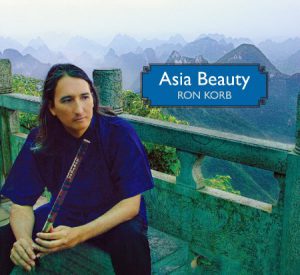Ron Korb and His Global Flutes
Podcast: Play in new window | Download
Subscribe: RSS
The first instrument that Ron Korb played was pretty much the first one everyone plays. The plastic recorders they give you in elementary school.
“Yes, it’s true, I started on recorder in in grade school,” Korb confirms.
But unlike most grade school students tooting “Mary Had a Little Lamb,” Ron Korb went on to sound much more sophisticated. Although he did end up with a degree in flute from the University of Toronto, he really didn’t follow a conventional music path.
“I quickly sort of found I could play by ear,” Korb recalls, “I just really enjoyed sort of veering off from the sheet music and playing my own melodies, but I didn’t actually get to play the silver flute until high school. I didn’t grow up in a musical family and so I kind of had to search it out on my own.”
Ron Korb still plays the silver flute. Two years ago he did a classically inspired album called Europa. However, Ron Korb is best know for a more exotic music that he’s been recording since his 1990 album, Tear of the Sun. He owns over 250 flutes from across the globe and he looks the part of the world music traveler. Now in his mid-fifties, he’s tall, with flat, high cheekbones and long, ruler straight brown hair streaming past his shoulders. It gives him a Native American look although he’s part Japanese. He’s wearing an Asian tunic that seems exotic even in New Orleans where I’m interviewing him.
“I did that for your benefit,” he jokes. “I could’ve come up here in a 3-piece suit, but I thought nah…”
“You don’t own a 3-piece suit,” I counter. “I bet you don’t own a 3-piece suit. Is this what you would normally wear? Or is this kind of stage clothing?”
“Yeah, sort of,” he replies, “but I mean I do actually have a lot of these and sometimes I just do wear them even, yeah, just even to go out you know, yeah.”
It’s typical for players of these traditional instruments to study with the masters, and Ron has done that, but when you play as many flutes as he does, that would mean studying all your life.
“When I was starting to learn Chinese flute, I studied with a master flute player.” Korb explains. “Same with Irish instruments, I did study with an Irish player for a while. But I often just do pick up something new and I just sort of work it out myself.”
That’s led to some trans global playing styles. “I will take Irish technique and apply it to the Chinese flute,” he continues, “like some of the finger vibrato and stuff, so now I kind of do kind of a crossover thing with a lot of them. Even silver flute, I’ll use a lot of the kind of breath expression things you get on shakuhachi and stuff, and use them on silver flute as well.”
Ron Korb doesn’t carry all his flutes with him on the road, but out of his satchel he pulls out one of a dozen or so flutes he travels with.
“This is kind of a hybrid,” he reveals as he brings out a bamboo flute.. “You know, talking about hybrid cars, this is like a hybrid instrument. It’s like just a regular bamboo flute or like a bansuri, really, but it has this sort of Middle Eastern scale.” He begins to play. “So I went from the Arabic scale into the whole Japanese thing,” he admits, laughing.
 Ron Korb has brought these sounds to over 30 albums, including his latest called Asia Beauty. It was nominated for a Grammy and won the Zone Music Reporter Award for Best World Album in 2016. It’s an ambitious album packaged like a book and contains a story that Ron wrote about a sorceress who takes over the kingdom and a flute player who saves the day.
Ron Korb has brought these sounds to over 30 albums, including his latest called Asia Beauty. It was nominated for a Grammy and won the Zone Music Reporter Award for Best World Album in 2016. It’s an ambitious album packaged like a book and contains a story that Ron wrote about a sorceress who takes over the kingdom and a flute player who saves the day.
“House of The Five Beauties, it’s like you’re watching the film.” Korb exudes, describing his process, “And I wrote it from beginning to end, and it’s not like I wrote an outline first and then started to write the different parts of it. I started at ‘Once upon a time’, and ended at ‘The End.’ Every night, I just came home, writing again, writing longhand, no computer. And I just had this idea of creating this story based on sort of five very powerful women, set in ancient China, who all could play these instruments. And it was based on my own experience. It was based on things that happened, you know, a few years before.”
Ron is a little vague about what those experiences my have been. “Well, I like the part about the young boy who plays the flute.” Korb begins to elaborate, “The fact that he has this pureness of mind, because I find a lot of time with myself and I think it’s fair to say a lot of people, we don’t really live in the now, right? Our mind is always clouded with these other things, and we can’t really just focus in on the moment, in that purity of the moment. So that’s a big thing for me. Another thing was of course, just experiencing true evil in your life and I don’t want to go into too deeply, but her source of power is her anger that she keeps in that jar, right. So yeah, it’s autobiographical in that sense.”
For Ron Korb, every one of his 250 flutes has a different sound and meaning.
“I think each flute has a different soul,” he declares. “It does sort of lead you to play different notes, like the native flute, of course, is a good example.”
He pulls a Bawu flute from China out of his satchel.
“This instrument is very limited, I mean it doesn’t have much of a range,” he discloses. “You can see the sound is produced by this little metal reed here and it’s a very beautiful tone. This instrument is used in the mountains, in Yunnan Province, and they use the natural reverb of the mountains as a kind of inspiration. It’s used in a lot of folk music. So that’s where I got the idea for the song, Two Mountains, you know, like just always–I’m, I’m a romantic guy, so I always think of you know, one man standing on one mountain, playing out and you know, hearing the reflection.”
The music that Ron Korb makes is only possible because of the last 100 years of travel and global communication. “We live in this incredible time of mass communication and like just seamless border crossing,” he acknowledges. “A place like Toronto has all this multiculturalism and it’s actually promoted, you know, actively promoted and embraced by all cultures.”
Ron Korb’s latest album is Asia Beauty on Humble Dragon Records.


Really enjoyed this interview. Such a talented and unique musician!
Really enjoyed the interview. Such a talented and unique musician!